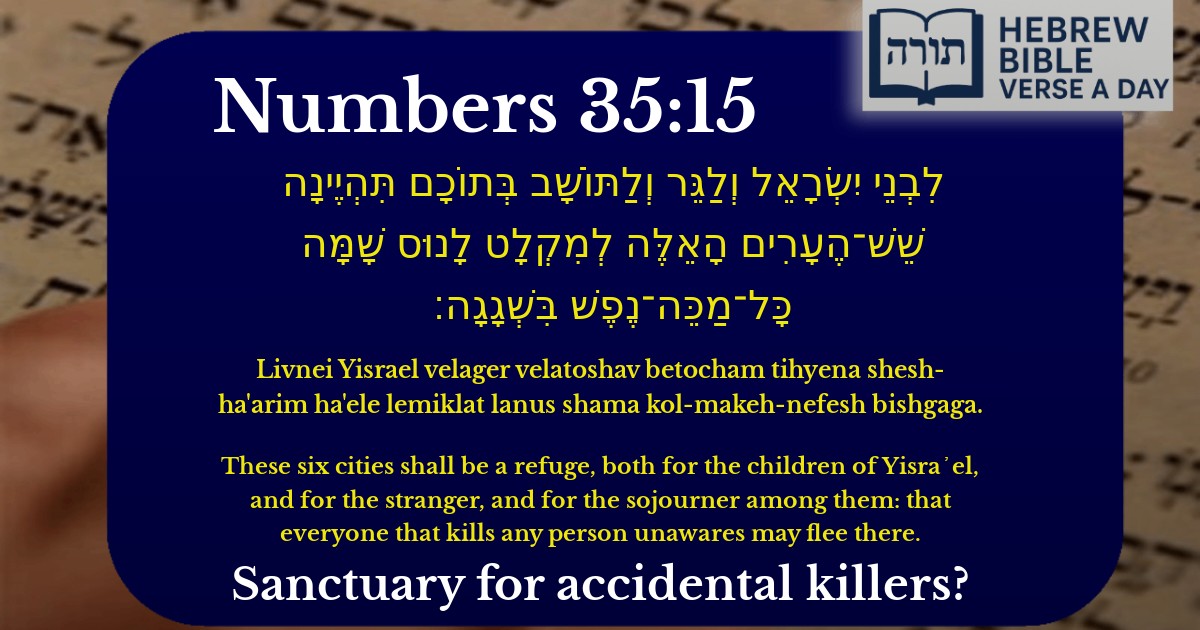Join Our Newsletter To Be Informed When New Videos Are Posted
Join the thousands of fellow Studends who rely on our videos to learn how to read the bible in Hebrew for free!
Hebrew Text
לִבְנֵי יִשְׂרָאֵל וְלַגֵּר וְלַתּוֹשָׁב בְּתוֹכָם תִּהְיֶינָה שֵׁשׁ־הֶעָרִים הָאֵלֶּה לְמִקְלָט לָנוּס שָׁמָּה כָּל־מַכֵּה־נֶפֶשׁ בִּשְׁגָגָה׃
English Translation
These six cities shall be a refuge, both for the children of Yisra᾽el, and for the stranger, and for the sojourner among them: that everyone that kills any person unawares may flee there.
Transliteration
Livnei Yisrael velager velatoshav betocham tihyena shesh-ha'arim ha'ele lemiklat lanus shama kol-makeh-nefesh bishgaga.
Hebrew Leining Text
לִבְנֵ֣י יִשְׂרָאֵ֗ל וְלַגֵּ֤ר וְלַתּוֹשָׁב֙ בְּתוֹכָ֔ם תִּהְיֶ֛ינָה שֵׁשׁ־הֶעָרִ֥ים הָאֵ֖לֶּה לְמִקְלָ֑ט לָנ֣וּס שָׁ֔מָּה כׇּל־מַכֵּה־נֶ֖פֶשׁ בִּשְׁגָגָֽה׃
לִבְנֵ֣י יִשְׂרָאֵ֗ל וְלַגֵּ֤ר וְלַתּוֹשָׁב֙ בְּתוֹכָ֔ם תִּהְיֶ֛ינָה שֵׁשׁ־הֶעָרִ֥ים הָאֵ֖לֶּה לְמִקְלָ֑ט לָנ֣וּס שָׁ֔מָּה כׇּל־מַכֵּה־נֶ֖פֶשׁ בִּשְׁגָגָֽה׃
🎵 Listen to leining
Parasha Commentary
📚 Talmud Citations
This verse is quoted in the Talmud.
📖 Makkot 10a
The verse is discussed in the context of the laws regarding cities of refuge (arei miklat) and who is eligible to seek refuge there, including Israelites, strangers, and sojourners.
📖 Bava Kamma 38b
The verse is referenced in a discussion about the inclusion of strangers and sojourners in the laws of cities of refuge, emphasizing the equal application of these laws to all residents.


The Purpose of the Arei Miklat (Cities of Refuge)
The verse (Bamidbar 35:15) establishes that the six Arei Miklat serve as a refuge not only for Bnei Yisrael but also for the ger (convert) and toshav (resident alien). Rashi explains that this inclusion emphasizes the Torah's principle of equal justice—the same laws apply to all who dwell among the Jewish people. The Rambam (Hilchos Rotzeach 8:10) further clarifies that these cities provide protection for one who kills unintentionally, allowing them to escape the vengeance of the victim's relatives until a fair trial can be conducted.
The Inclusion of Ger and Toshav
The Talmud (Makkos 9a) discusses why both terms—ger and toshav—are specified. A ger refers to a full convert (ger tzedek), while a toshav is a non-Jew living among Israel who has accepted the Seven Noahide Laws (ger toshav). The Sifrei (Bamidbar 161) teaches that this demonstrates the Torah's concern for justice even for those who are not fully part of the covenant, ensuring that accidental killers among them also have a place of refuge.
The Nature of Unintentional Killing
The phrase "כָּל־מַכֵּה־נֶפֶשׁ בִּשְׁגָגָה" ("anyone who kills a person unintentionally") is interpreted by the Rambam (Hilchos Rotzeach 6:1) as referring to cases where the killer lacked intent but was still negligent to some degree. The Mishnah (Makkos 2:1) elaborates that the Arei Miklat do not protect someone who acted with full awareness (mezid), only those whose actions were truly accidental (shogeg).
Spiritual Dimensions of the Arei Miklat
The Midrash Tanchuma (Masei 8) suggests that the Arei Miklat also serve as a place of repentance. The accidental killer must remain there until the death of the Kohen Gadol, symbolizing atonement. The Chizkuni adds that this teaches that even unintentional sins require reflection and teshuvah, as all loss of life diminishes the Divine presence in the world.